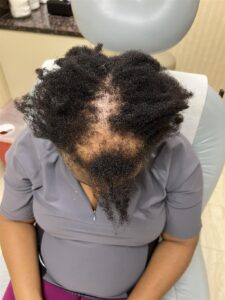Metformin is a widely used medication for managing type 2 diabetes, but its impact on hair health has been gaining attention. While some fear that metformin may contribute to hair loss, emerging research suggests that it may actually support hair growth, particularly in certain conditions like central centrifugal cicatricial alopecia (CCCA). Let’s explore the connection between metformin and hair loss, its mechanisms, and how different forms of metformin may affect hair health.

What Is Metformin?
Metformin is an oral medication primarily prescribed to treat type 2 diabetes. It works by lowering blood sugar levels, improving insulin sensitivity, and reducing glucose production in the liver. Beyond diabetes management, metformin is sometimes used to treat polycystic ovarian syndrome (PCOS). It has also been studied for its longevity, anti-aging and anti-inflammatory properties, making it a popular topic in longevity and wellness discussions.
Metformin and Hair Loss: The Science
One of the concerns surrounding metformin is whether it causes hair loss. However, current research does not support a direct link between metformin and hair shedding. In fact, studies have shown that metformin may actually promote hair growth in specific conditions.
A key area of research involves its potential to improve CCCA, a type of scarring alopecia that primarily affects Black women. Studies suggest that metformin’s ability to reduce inflammation and improve insulin resistance may contribute to stabilizing and even improving hair regrowth in patients with CCCA. In addition they show that the drug may have molecular effects that reduce scarring around the hair follicles. Since inflammation and metabolic dysfunction are known contributors to other hair disorders in addition to CCCA, metformin’s role in modulating these pathways is significant. It is also being studied as a treatment for alopecia areata a type of autoimmune hair loss.
Topical Metformin vs. Oral Metformin
While oral metformin is the standard form used for diabetes and other systemic benefits, there is growing interest in topical metformin for targeted treatment of hair loss. Topical formulations are being explored for their potential to deliver metformin’s anti-inflammatory and insulin-sensitizing effects directly to the scalp. This would possibly reducing side effects associated with oral use.
Research on topical metformin for hair growth is still in its early stages. More studies are needed to determine its efficacy compared to oral administration.

Side Effects of Metformin
People tend to tolerate metformin. It does,however, have some side effects, including:
- Gastrointestinal issues (nausea, diarrhea, bloating)
- Vitamin B12 deficiency, which may contribute to hair thinning in some individuals
- Lactic acidosis (a rare but serious condition)
While vitamin B12 deficiency has been linked to hair loss, it can be managed with supplementation. If you’re taking metformin and experiencing hair thinning, it’s worth discussing B12 levels with your healthcare provider.
Other Health Benefits of Metformin for Longevity and Wellness
Beyond diabetes, metformin has been extensively studied for its potential benefits in:
- Longevity: Research suggests metformin may promote lifespan extension by reducing inflammation, oxidative stress, and cellular aging.
- Cancer Prevention: Some studies indicate that metformin may lower the risk of certain cancers by regulating metabolic pathways.
- Cardiovascular Health: Metformin improves vascular function and reduces the risk of heart disease.
- Polycystic Ovary Syndrome (PCOS): Metformin is an option to manage PCOS-related metabolic issues and may also aid in hair regrowth for those experiencing hair thinning due to androgen excess.
Conclusion
While concerns about metformin and hair loss exist, research suggests that metformin may actually benefit certain types of hair loss, particularly those linked to inflammation and metabolic dysfunction. Research highlights metformin’s role in CCCA improvement, and its broader benefits for health and longevity make it a promising medication beyond diabetes management.
If you are experiencing hair loss while on metformin, it is important to consider other potential factors. There are many causes of alopecia such as nutrient deficiencies, underlying conditions, or medication side effects. Looking for a dermatologist who specializes in hair loss? Schedule a consultation with our hair loss expert here!


